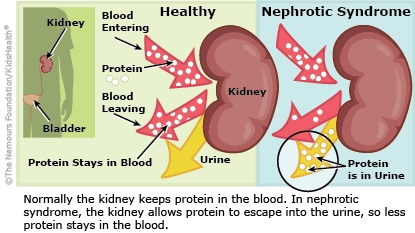Nephrotic Syndrome: How to Care for Your Child
Nephrotic syndrome happens when the kidneys can't filter blood normally. Too much protein from the blood leaks into the urine (pee), causing low protein levels in the blood (hypoalbuminemia). Without enough protein in the blood, water moves from the blood into other parts of the body. This leads to swelling (edema) in the eyes, ankles, feet, belly, and other parts of the body. Kids with nephrotic (neh-FROT-ik) syndrome can have other problems too.
Taking steroid pills for a few months usually helps nephrotic syndrome get better. Flare-ups (or relapses) are common, especially after a viral infection. If this happens, your child will need to take steroids again.


Follow your health care provider's directions for:
-
giving your child any medicines
-
going for any blood tests or urine tests
-
lowering salt or increasing protein in your child's diet (your health care provider may recommend working with a dietitian to help with diet changes)
-
going to see any medical specialists, such as a nephrologist (kidney doctor) or genetic counselor
-
whether you need to keep track of your child's:
-
weight
-
protein in the pee
-
liquids that they drink
-
whether your child needs any vaccines (shots)
-
when to follow up

Your child has signs of an infection, such as:
You notice side effects of the steroid medicine, such as:
Also call your health care provider if your child has swelling that gets worse or if your child seems very cranky.

Your child has:

What causes nephrotic syndrome? Often the cause of nephrotic syndrome isn't known (this is called idiopathic nephrotic syndrome). In kids, the most common cause is minimal change disease. This can be brought on by infections, allergic reactions, and some medicines. Kids with this condition often outgrow it in their teens. Nephrotic syndrome also can be due to being very overweight, taking some types of medicines, or a medical condition (such as lupus).
What problems can happen in nephrotic syndrome? Some kids with nephrotic syndrome just have swelling of the eyes and other parts of the body. But others may: